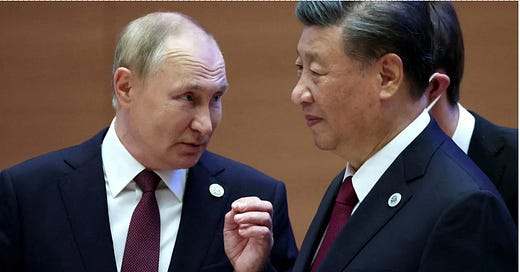Xi and Putin already coordinating their response to Israel’s war against Iran, awaiting Trump’s decision to fully intervene
"The argument gaining ground in Beijing is that Iran must accept its losses, moderate its ambitions, and adopt a more pragmatic approach that favors regional stability." — Tuvia Gering
By midday Thursday in the Middle East, Israel’s ambassador to Japan, Gilad Cohen, replied to a post on X.com from China’s Consul General in Osaka, Xue Jian, accusing him of antisemitism, of being dangerous, and of insulting the memory of the Holocaust. In his tweet, Xue had compared Israel to the Nazi regime. It is highly likely that the Chinese diplomat, in an attempt to gain the attention and favor of his leader, bluntly expressed what is being said in the halls of Zhongnanhai. However, just a few hours later, he deleted the public comment.
This slip by the Chinese diplomat — a sign of the aggressive propaganda machinery China is using against Israel — occurred almost simultaneously with a joint statement by President Xi Jinping and his Russian counterpart, Vladimir Putin, who, following a phone call, strongly condemned Israel for its attacks on Iran, called for de-escalation, and rejected any military solution to the conflict and Iran’s nuclear program. Xi’s public tone aims to project diplomatic neutrality.
Without naming the United States, Xi stated that “major countries” with “special influence” in the region should rely exclusively on diplomatic tools to calm tensions. At nearly the same time, Israel’s ambassador in Beijing reported that dialogue channels with China remain open despite the criticism.
This new turn on the international chessboard raises a number of questions — such as whether Beijing and Moscow would intervene militarily to defend their protégé, Iran, which sells 90% of its oil to China, and where Putin maintains 200 Russian nuclear technicians at the Bushehr facility.
At the same time, both countries are capitalizing on the fact that Donald Trump is currently busy supporting his regional ally Benjamin Netanyahu — despite having promised to pull out of the Middle East — which diverts Washington’s focus from the so-called Pivot to Asia, that is, confronting its new enemy: the world’s second-largest economy and its main trading partner, China.
An analysis of the Russia-China statement suggests that — barring a major catastrophe such as attacks on nuclear sites causing Chinese or Russian casualties, or direct U.S. intervention — Beijing and Moscow prefer to play an active, but non-confrontational, diplomatic role. The most likely scenario is that, particularly China, will push for indirect mediation to position themselves as responsible stabilizing powers, without breaking with Israel or directly challenging the United States. This strategy stems not from pacifist conviction, but from a power calculus in an increasingly fragmented global order, with goals like weakening Western hegemony and solidifying alliances in the so-called Global South. Additionally, China is economically weakened, and Russia is militarily overstretched due to its invasion of Ukraine.
Beyond the visible diplomatic front, both Moscow and Beijing appear to be exploring indirect mediation channels through the Shanghai Cooperation Organization or joint peace initiatives, in a bid to present themselves as alternative arbiters to the Western axis.
A second, less likely scenario for now would be indirect support to Iran — economically, politically, or symbolically — if the Iranian regime weakens internally, if the U.S. intervenes militarily, or if Israel strikes sensitive targets like Bushehr. The odds of indirect military involvement (such as technical assistance, reinforcement of air defenses, or naval deterrence) are low, since neither Moscow nor Beijing wants to be dragged into an open confrontation that could destabilize trade or stretch resources thin.
According to Sanam Vakil, director of the Middle East and North Africa Programme at Chatham House, Iran may also try to involve China to force a de-escalation if it finds itself cornered. Furthermore, the regional order desired by the U.S. and Israel excludes China as a military or technological actor, making direct confrontation unlikely.
Finally, the least likely scenario is that Russia and China will opt for pragmatic neutrality — letting the conflict unfold while reaping diplomatic gains.
Behind the scenes, the agreements and interests among China, Russia, and Iran run far deeper. Israeli analyst Tuvia Gering, an expert on China-Israel relations affiliated with CTI, INSS, and the Atlantic Council, tells El Español that over the past year, the three countries “have shown closer coordination than in the past and have gone beyond the merely performative and largely symbolic trilateral partnership that previously defined their ties.”
Keep reading with a 7-day free trial
Subscribe to OrientExpress Marga Zambrana to keep reading this post and get 7 days of free access to the full post archives.





